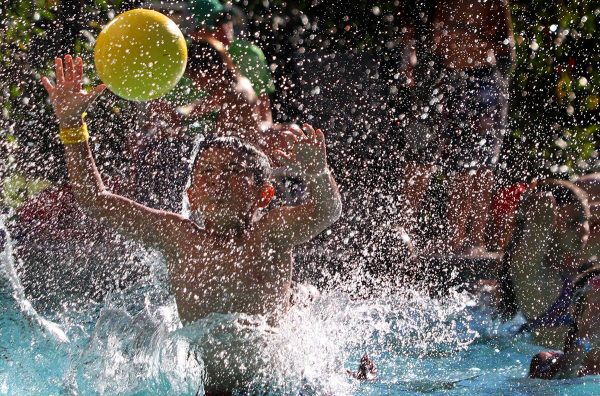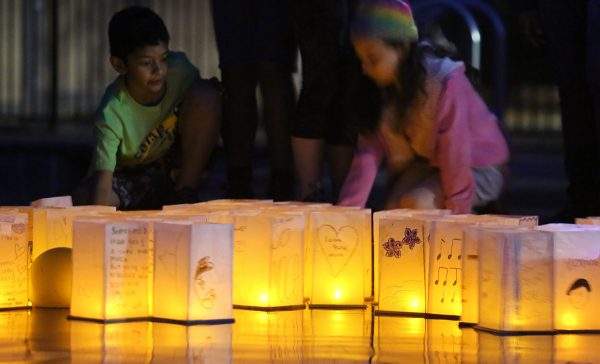Inside the Life of a Camp Buddy: Interview with Gary McMath
Meet Gary McMath, one of the Camp Buddies at Camp Erin© Santa Cruz. The father of five is a former Netflix executive who will volunteer with Camp Erin for the third year. Gary has been a wonderful contributor to camp, so we sat down with him to share what a “day in the life” is like, as a Camp Erin Camp Buddy.
How did you find out about Camp Erin Santa Cruz?
Our youngest daughter’s biological father passed away when she was eight. She attended a Camp Erin in Washington state and had a great experience. Then two of my daughters’ siblings were Camp Buddies — when I heard that Santa Cruz also had a Camp Erin chapter, my wife and I applied to volunteer.
As far as activities go, what are some camp favorites?
Drum-making was new last year and it was FANTASTIC. That was so important to these kids — the drum making and playing the drum was unbelievable. I was so impressed by the gentleman that led the group. Some cat they got out of Philly, Josh Robinson. That was AMAZING. He was just unbelievable. I can’t say enough about that. That whole process of making drums, playing drums, learning about drums. The kids loved it.
The open swim is also wonderful. There’s a lot of free time where they just play in the covered area: basketball, foosball, ping pong. The fireside night is great. The kids get so excited about the zip line. They do archery, but the kids don’t seem to find it as monumental as the zip line. The drum circle and zip lining, I think the kids would want to do that all day. They like the meals too, those are a lot of fun. As a volunteer I find that breakfast, lunch, and dinner is a pretty awesome time to sit around and talk to kids.

What qualities do you think are important in a Camp Buddy?
To be honest, I felt a little under-qualified! I have taught schools as a volunteer. I’ve been a boy scout leader, I have been a coach, I have raised five children. Those are my qualifications. Many of the Camp Buddies are professionals: social workers, chaplains, staff at Hospice of Santa Cruz County with a lot of experience. By comparison, I felt like a fish out of water. By the second year, I understood how the camp worked, and I think I understand how to help these kids on this journey, but boy, the lovely, wonderful, gifted, dedicated professionals around me made me work hard at what I was doing.
As a volunteer, how would you describe the flow of Camp Erin Santa Cruz? What can kids and parents expect?
In a sense, Camp Erin is very similar to other overnight camps: the volunteers and staff take steps to bring kids into camp and make them feel welcome. Where this is different is that these kids are bound together by something that is unique to them, in the fact that they have been saddled with a lot of loss. The camp does a really good job of normalizing that.
Grief can be an up and down ride for the kids. The camp structure is a lot like life: kids have fun moments, and they have sad moments — but they need to know that there’s going to be another fun moment, and then there’s going to be another sad moment. Camp Erin does a really good job taking them through this process; to let kids see that their grief is normal, and other kids also go through that up and down cycle. They aren’t alone.
How would you describe the volunteers’ role, and what qualities make a good volunteer?
I’d say… Be human. Everyone has had loss. We all want to volunteer. Every volunteer I’ve met is compassionate. Everyone seems to be committed to the process, and the logistics are handled very well, and when you need help, help is really there. You’re never really stuck in a situation with a camper, feeling like you don’t have the tools to help them. You can use the tools you have, and if you need more, there are plenty, plenty of volunteers who have tremendous expertise in this. The first year, I was a little worried about it. The second year, I knew I wouldn’t get stuck without the right words or tools to help the child move through their feelings. As a Camp Erin volunteer, you’re not a coach. You’re a little bit like a teacher.
What is the volunteer training process like?
There are two or three gatherings prior to the event in which volunteers are trained on what to expect. The training really covers how to deal with kids in grief. The first year, it was like sipping from a fire hose. The second year, I could understand it better. I offered up some of the things that I had learned to new volunteers. Hopefully this coming year, I’ll be able to offer the newer incoming counselors from some of those things — the real tactical things that you’ll experience at night, what mornings actually look like, what happens when the lights turn off at night. Insights on those first few nights are probably helpful to listen to people who have done it before.
What do you like most about Camp Erin?
It’s unusual, but I have a daughter who has been through this process. I have a child who has lost their father. I can’t even imagine how she gets through each day with that. This gives me some idea of how she’s doing everything that she can to normalize that — that’s what she needs: the living have to keep moving on. When you’re young, boy, the insecurity of it all, that’s just amazing that some of these kids function at such a high level. Some of the kids with the greatest loss, losing a mother or father, or being present when a family member dies. I can’t imagine how they have the strength how they help other children who have gone through that level of grief. It was surprising how strong and resilient these kids are.
Do you have any advice for someone who is considering volunteering?
There are a couple of absolute realities: you’ll be around children, and death is inevitable. You’ll have to face death directly yourself, that’s hard enough, but if there’s children around you, in your family, or your children, you’ll need these tools to help get through that process. These are tools that aren’t readily taught, but they can be learned from places like Camp Erin. I would encourage anyone to volunteer.
Do you have anything else that you’d like people to hear?
The most emotional thing happens the first night when kids put the image of their loved one up. That is HARD. Especially for the youngest kids. The luminary ceremony with the lights — those two events are so emotional. They’re not highlights but they’re probably the most important things that the kids do. Introducing themselves in front of the whole camp, while they’re there, showing their loved one who has passed away, and sending that tribute out on the water. Those are the most important things that are done at camp.

That sounds powerful.
‘Powerful’ is the right word for that. It’s the most emotional thing that I’ve seen ever, and I’ve seen it twice. It is an unbelievable event.
—
Join Camp Erin as a Volunteer!
Looking for something meaningful to do this October? Camp Erin Santa Cruz is an opportunity to change lives over one heartfelt, activity-filled weekend. Volunteers can stay the whole weekend, or simply drop in for a few hours to lend an extra hand.
To apply or learn more, click here.
